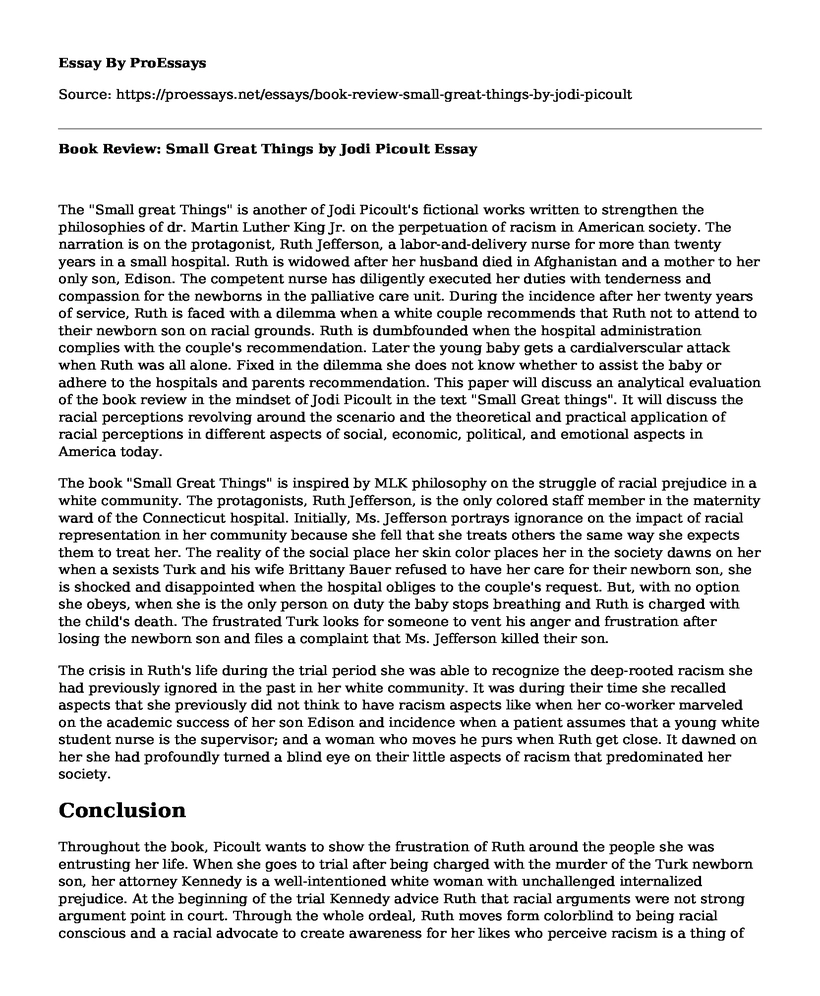The "Small great Things" is another of Jodi Picoult's fictional works written to strengthen the philosophies of dr. Martin Luther King Jr. on the perpetuation of racism in American society. The narration is on the protagonist, Ruth Jefferson, a labor-and-delivery nurse for more than twenty years in a small hospital. Ruth is widowed after her husband died in Afghanistan and a mother to her only son, Edison. The competent nurse has diligently executed her duties with tenderness and compassion for the newborns in the palliative care unit. During the incidence after her twenty years of service, Ruth is faced with a dilemma when a white couple recommends that Ruth not to attend to their newborn son on racial grounds. Ruth is dumbfounded when the hospital administration complies with the couple's recommendation. Later the young baby gets a cardialverscular attack when Ruth was all alone. Fixed in the dilemma she does not know whether to assist the baby or adhere to the hospitals and parents recommendation. This paper will discuss an analytical evaluation of the book review in the mindset of Jodi Picoult in the text "Small Great things". It will discuss the racial perceptions revolving around the scenario and the theoretical and practical application of racial perceptions in different aspects of social, economic, political, and emotional aspects in America today.
The book "Small Great Things" is inspired by MLK philosophy on the struggle of racial prejudice in a white community. The protagonists, Ruth Jefferson, is the only colored staff member in the maternity ward of the Connecticut hospital. Initially, Ms. Jefferson portrays ignorance on the impact of racial representation in her community because she fell that she treats others the same way she expects them to treat her. The reality of the social place her skin color places her in the society dawns on her when a sexists Turk and his wife Brittany Bauer refused to have her care for their newborn son, she is shocked and disappointed when the hospital obliges to the couple's request. But, with no option she obeys, when she is the only person on duty the baby stops breathing and Ruth is charged with the child's death. The frustrated Turk looks for someone to vent his anger and frustration after losing the newborn son and files a complaint that Ms. Jefferson killed their son.
The crisis in Ruth's life during the trial period she was able to recognize the deep-rooted racism she had previously ignored in the past in her white community. It was during their time she recalled aspects that she previously did not think to have racism aspects like when her co-worker marveled on the academic success of her son Edison and incidence when a patient assumes that a young white student nurse is the supervisor; and a woman who moves he purs when Ruth get close. It dawned on her she had profoundly turned a blind eye on their little aspects of racism that predominated her society.
Conclusion
Throughout the book, Picoult wants to show the frustration of Ruth around the people she was entrusting her life. When she goes to trial after being charged with the murder of the Turk newborn son, her attorney Kennedy is a well-intentioned white woman with unchallenged internalized prejudice. At the beginning of the trial Kennedy advice Ruth that racial arguments were not strong argument point in court. Through the whole ordeal, Ruth moves form colorblind to being racial conscious and a racial advocate to create awareness for her likes who perceive racism is a thing of the past to face reality with the minimal things on racial prejudice happening in and out of their lives.
References
Picoult Jodi "Small Great Things"- book review". litcritpop. 7 February 2018. Retrieved 16 March 2018.
Cite this page
Book Review: Small Great Things by Jodi Picoult. (2022, Aug 15). Retrieved from https://proessays.net/essays/book-review-small-great-things-by-jodi-picoult
If you are the original author of this essay and no longer wish to have it published on the ProEssays website, please click below to request its removal:
- Critical Essay Sample on Death of a Salesman
- A Literary Essay Sample: Conflict Between Romanticism and Realism in Jane Austen's Sense and Sensibility
- Comparative Analysis of Epic Poems: The Epic of Gilgamesh and Odyssey
- Literary Analysis Essay on Roles of Women in Frankenstein
- John Donne: Master of Contradiction and Theology - Research Paper
- Essay Example on Aesir-Vanir War: Ancient Conflict of Norse Deities
- Essay Example on Antigone: Conflict of Divine and Human Law







